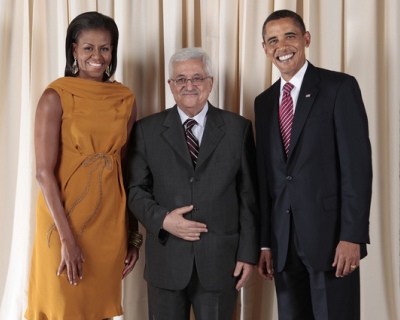Palestinian Authority President Mahmoud Abbas is not known internationally or locally for his charisma or his political daring. Rather he is known for his pragmatism. Whether his decision to go the UN Security Council in a bid for membership as a sovereign state is the most effective step in trying to achieve an independent Palestinian state free of occupation is in serious doubt, but what is clear is that his speech shows he is aware of the international community’s limitations on him, and specifically, the US’s impermeable and biased policy that sides with Israel.
This is why Abbas stated, as Joseph pointed out in his post reacting to Dahlia’s post about his outline for a new Palestinian state, that the PA is not out to “delegitimize Israel” but rather to “delegitimize Israel’s occupation.” Joseph rightly argues that some Palestinians would disagree with this view:
Leaders of the popular non-violent movements in the West Bank would likely take issue with such a stance for the simple reason that they operate under the assumption that one can’t separate Israel from its occupation, or the incredible inequality alive within the official Israeli position vis-a-vis Palestinian citizens of the Jewish state. Thus, any attempt to ‘delegitmize’ Israel’s occupation ultimately targets the legitimacy of Israel as a whole.
It also may very well be that this is hurting the PA’s already shaky ground of legitimacy among Palestinians in the West Bank and that Abbas looks to be “pandering to the international community.” But Abbas is a politician, not an activist, and thus an important point is missed here.
Whether we (activists against Israeli occupation and policies) like it or not, there is a difference between ideology and politics, activism and diplomacy. States don’t act out of moral resolve but rather out of political interests – real politik – and most human rights activists don’t act out of pragmatism but rather out of conviction. In most cases, activists are never satisfied because reality never lives up to ideals.
As far as separating Israel from its occupation, I find this impossible to do as a citizen, activist and free-thinker – but I feel that while in principle, as well as often times in practice (i.e. boycotts), it is impossible to separate Israel from its occupation, those in a position of leadership who are committed to finding a solution must do their best to do this – not because it is the most morally just thing to do, but rather because it is the most practical thing to do. If they cannot, I fear it also lends legitimacy to those in power that say that cannot separate Palestinians from terrorists, Arab culture from discrimination against women, or anti-Semitism from anti-Zionism. Moreover, as far as moral culpability vis-a-vis the legitimacy of a state, just as one could argue that Israel’s actions delegitimize its ability to be treated as a normal nation among nations, so one could argue about Jordan’s treatment of Palestinians, Turkey’s treatment of Kurds, or most Eastern European countries’ treatment of Roma.
Sometimes taking the moral high ground just doesn’t correspond to the reality on the ground. And sometimes what leaders do to stay in the political game costs them credibility at home.


